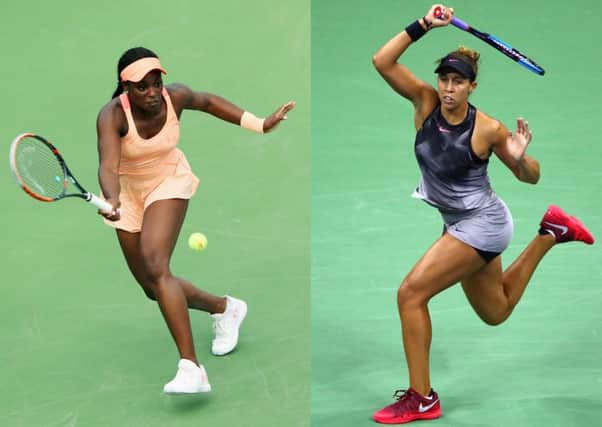Sloane Stephens and Madison Keys following Williams sisters


For two decades, Venus and Serena have dominated women’s tennis. They have taken charge at the top of the rankings and, between them, collected 30 grand slam singles titles. But when it came to finding their successors, the likely contenders were thin on the ground. Players came and went but none looked capable of filling the mighty void that would be left when the Williams sisters retired (not that either woman shows any sign of hanging up their racket).
Today, however, Sloane Stephens and Madison Keys, who were four and two respectively when Serena won the first of her grand slam titles in 1998, will go toe-to-toe for the US Open trophy.
Advertisement
Hide AdAdvertisement
Hide AdBoth women have flattered to deceive over the years, both making their major breakthrough at the Australian Open by reaching the semi-finals. In 2013, Stephens beat Serena to reach the last four and then took a pasting from Victoria Azarenka and two years later, Keys beat Venus to reach the semi-finals only to be put in her place by Serena once she got there.
Since then, neither woman has been able to build on that success. Stephens was 19 when her moment in the spotlight came and she thought she had made it. She loved the attention, she even got herself involved in a Twitter spat with Serena (and it is never wise to antagonise Serena, not if you have to face her again on a tennis court) and she appeared destined for a role as a one-hit wonder.
Keys, too, was 19 when her moment in Melbourne came. Coached then by Lindsay Davenport, she finally managed to control her emotions and simply rely on her natural talent for clobbering the ball to marmalise the opposition. But then she and Davenport went their separate ways and Keys was still good but never quite as good again.
Yet this year, both women have grown up – they have had to. Injury and surgery have kept them both from the courts and both realised how much they miss tennis, how much competing means to them and just how much work is involved in getting to the top.
Stephens did not play at all after the Olympics in Rio due to injury and then when, at last, she thought she was ready to return at the start of this year, she discovered she needed surgery to remedy a stress fracture in her left foot. She spent this year’s Australian Open lying on her couch with her leg in a cast watching forlornly as her friends and rivals played in the Melbourne sunshine.
Keeping her sane was the regular stream of texts and messages from her friend Keys who was herself recovering from surgery to her left wrist. Keys, now working with Davenport again, was able to come back first but still her wrist was not right. Needing another operation to sort the problem in June, she raced back to play at Wimbledon.
There she found Stephens taking her first faltering steps on a match court in 11 months. Neither woman stayed long in SW19 but from there, Keys beat Coco Vandeweghe to win the Stanford title and, on Thursday night, flattened her again to reach the US Open final. Stephens, meanwhile, kicked on to reach the semi-finals in Toronto and Cincinnati and beat Venus on Thursday to reach her first grand slam final. It has been a frustrating and emotional journey for them but both seemed to have learned the same lesson.
“I think you just really appreciate being out here,” Keys said. “I think that’s Sloane and me right now. I think we’re both just loving our time on court, and it’s really showing.”
Advertisement
Hide AdAdvertisement
Hide AdStephens agreed wholeheartedly. Looking back on her first major semi-final in 2013, she knows she is a different player and a different person.
“I was a baby,” she said. “A lot of things came with making that semi-final and beating Serena and having that all happen in my life. But everything happens for a reason. Maybe that happened then so I could be prepared for this now.”
Today they will play for only the second time in their careers [Stephens won their first outing two years ago] in the first all-American grand slam final since 2002 when Serena beat Venus in New York. At last the Williams effect is working.